chronicle.lu/categorieslivingcommunityclubs
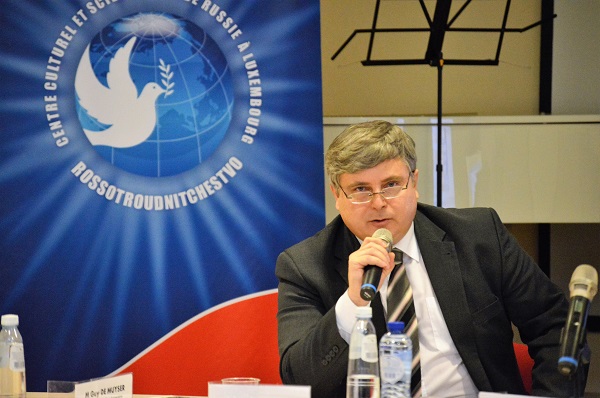
On Thursday 19 November 2015, the Cultural and Scientific Centre of Russia in Luxembourg held a roundtable to commemorate the 90th anniversary of Russia's public diplomacy initiative and the 40th anniversary of the A.S. Pouchkine Cultural Centre.
To begin with, roundtable moderator and President of the A.S. Pouchkine Cultural Centre, Vladimir Sokolov, provided a historical overview of public diplomacy in Russia, highlighting how its name and function altered through the course of Russian and world history whilst remaining a key component of cultural exchange and activity organisation.
In 1925, the Rossotroudnitchestvo was established under the name of La Société pour les relations culturelles avec l'étranger (VOKS) at a time when a new Russian government has not made its mark in the international sphere and therefore was looking to create a new political system through which to support the scientific and cultural intelligentsia at home and abroad.
This entity was initially directed by Olga Kameneva, sister of Leo Trotsky and wife of Lev Kamenev, first head of state of the Soviet Union. The organisation received the support of numerous renowned Russian and international academics and intellectuals, including poet Vladimir Maïakovski and physicists Albert Einstein and Marie Curie. By 1957, the USSR held partner associations in 47 different countries.
With the advent of the Cold War, the function of the organisation began to change, becoming L'Union des sociétés soviétiques d'amitié et de relations culturelles avec les pays étrangers (SSOD) in 1958. The duty of the SSOD, in addition to establishing contacts abroad, was teaching the history and culture of other countries to Soviet citizens, often acting as the sole exchange link between Western countries and the USSR as relations between the two began to dissolve.
By the 1980s, Russian language courses were organised by the SSOD in more than 90 countries, taken by around 600,000 people. In the 1990s, the dissolution of the Soviet Union saw the SSOD become the Centre russe de coopération international dans le domaine des sciences et de la culture près le Gouvernement de la Fédération de Russie (Roszaroubejsentr) and, for the first time, a government body. It was during this period of stability that centres opened in the US, France, Belgium, Slovakia and Vietnam with the continual primary objective of providing cultural information. However, it became important to create international relations not only with faraway countries, but also with neighbouring Commonwealth of Independent States (CIS) Member States. In this way, L'Agence Fédérale pour la CEI, la diaspora russe à l'étranger et la coopération humanitaire internationale (Rossotroudnitchestvo) was formed.
During the roundtable, formed by several representatives of Russian organisations and of the Luxembourg Government, participants examined whether Luxembourg society would want to develop relations in Russis and, if so, who would be the actors involved in this next step of the centre.
Director of the Ministry of Culture, Bob Krieps, was enthusiastic about the idea, stating that the Ministry would like to collaborate more closely to this end and hold a cultural programme over the next few years. He commented that "It is about animating the dynamic forces of civil society" before declaring "we are interested and motivated to help." On the other hand Raymond Haasch, Coordinator of the Centre for Documentation and Information on Higher Education, was "intrigued" by the question, claiming that there were already a lot of projects in the country, as evidenced by the the small amount of russophones in the Grand Duchy which has grown into a community of several thousand.
A central topic running through the roundtable was the lack of Russian language classes in schools in the Grand Duchy, with nearly all participants expressly lamenting this.
Raymond Haasch outlined this as something to consider for the future, whilst others pointed to the continued prestige of the language. Olga Valizer, Executive Director of the Club Russe de Luxembourg stated that "interest in the language [in Luxembourg] remained stable" with more than 30 people currently enrolled in classes, and explained that the Club Russe also organises courses in French and Luxembourgish for Russophones. Meanwhile Anastasia Belotserkovskaya, a Russian language teacher and researcher at the University of Luxembourg reported that a lot of people she spoke to felt there was a lack of common meeting, indicating an area that could be improved for the future. Bob Krieps claimed that although the Ministry showed interest in creatine further collaborative projects, the first step would be in creating a committee dedicated to this particular endeavour.
"I am very pleased that the discussion took on wider range than just culture," concluded Youry Sokolov, whilst Vladimir Sokolov found that "We were privileged with a certain decentralised exchange."
The roundtable drew to a close with Youry Sokolov proposing, "We could designate a certain number of high schools or schools to propose Russian classes".
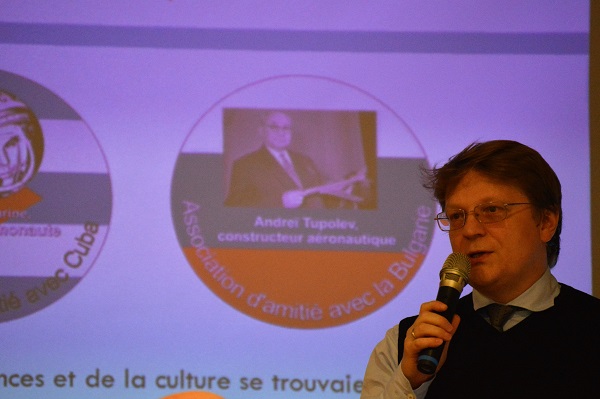
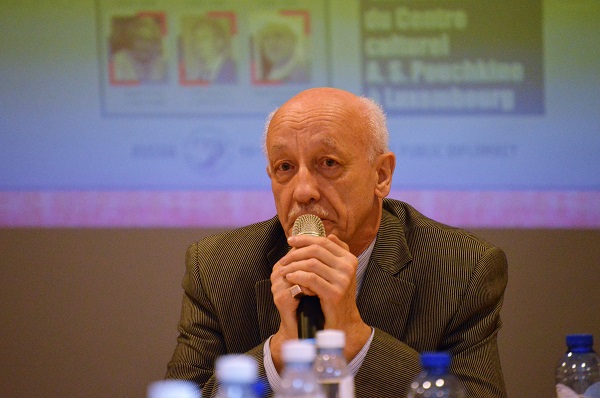
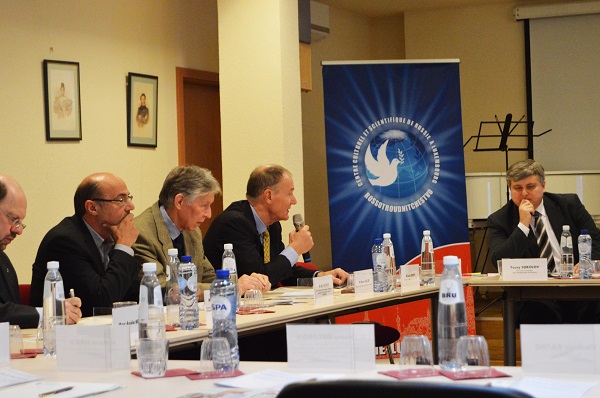
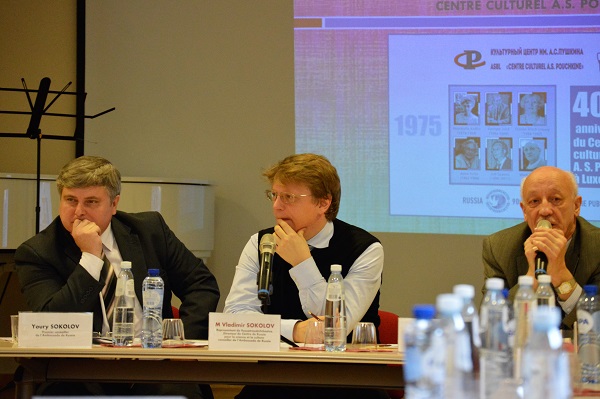
Photos by Sarah Graham (Top: Youry Sokolov, First Counsellor of the Russian Embassy. 2nd: Vladimir Sokolov, President of the AS Pouchkine Cultural Centre. 3rd: Vitaly Zazvonov, Representative of Rossotroudnitchestvo, Director of Centre de Russie pour la Science et la Culture, Counsellor of Russian Embassy)
No comments:
Post a Comment